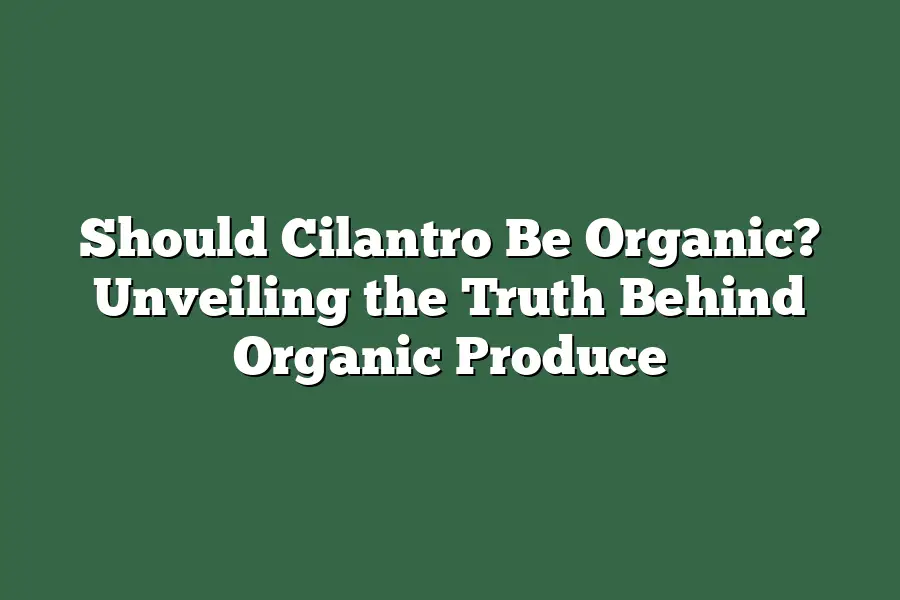When it comes to cilantro, choosing organic can be beneficial. Organic cilantro is grown without synthetic pesticides, herbicides, or fertilizers, making it a better choice for your health and the environment. Additionally, organic farming practices promote biodiversity and soil health. However, if organic cilantro is not available or is too expensive, conventional cilantro can still be safe to consume after washing it thoroughly.
Hey there, foodies!
Are you torn between splurging on organic cilantro or sticking to the conventional bunch?
Today, we’re exploring the truth behind organic farming practices for cilantro.
Discover the health benefits, environmental impact, affordability, and key factors for choosing between organic and non-organic cilantro.
Get ready to make informed decisions that nourish both you and the planet!
Let’s dive in together.
Let’s go!
Table of Contents
Health Benefits of Organic Cilantro vs. Non-Organic Cilantro
When it comes to choosing between organic and non-organic cilantro, the health benefits play a significant role in decision-making.
Let’s delve into the differences to help you make an informed choice.
1. Nutrient Content Comparison
Organic cilantro is grown without synthetic pesticides, which allows the plant to retain more nutrients compared to its non-organic counterpart.
Research by the Journal of Agricultural and Food Chemistry found that organic produce can have higher levels of certain nutrients, including antioxidants like vitamin C.
These antioxidants are essential for boosting immunity and fighting inflammation in the body.
2. Reduced Chemical Exposure
Non-organic cilantro may carry traces of synthetic pesticides, which can have adverse effects on health.
Studies have shown that prolonged exposure to these chemicals could lead to various health issues, including hormonal imbalances and an increased risk of certain diseases.
Opting for organic cilantro helps reduce the intake of potentially harmful chemicals, promoting better overall health.
3. Environmental Impact
Choosing organic cilantro also has positive implications for the environment.
Organic farming practices prioritize sustainability and soil health, reducing the pollution of water sources and preserving biodiversity.
By supporting organic cultivation methods, you are contributing to a healthier planet for future generations.
4. Taste and Freshness
Beyond the health benefits, many enthusiasts of organic cilantro appreciate its superior taste and freshness.
Organic cultivation techniques often focus on enhancing flavor profiles and ensuring that the produce is harvested at the peak of freshness.
This attention to detail can make a noticeable difference in the overall dining experience, especially for dishes that rely on the distinct flavor of cilantro.
the choice between organic and non-organic cilantro ultimately boils down to personal preferences and priorities.
While both options may have their pros and cons, the health benefits, reduced chemical exposure, positive environmental impact, and superior taste of organic cilantro make it a compelling choice for health-conscious individuals and eco-conscious consumers alike.
Environmental Impact of Organic Farming Practices
When it comes to the debate on whether cilantro should be organic, considering the environmental impact of farming practices is crucial.
Let’s dive into how organic farming methods affect the environment.
Decreased Chemical Use
One of the key benefits of organic farming is the reduced reliance on synthetic chemicals.
Conventional farming practices often involve the heavy use of pesticides and fertilizers, which can have detrimental effects on ecosystems.
According to a study by The Organic Center, organic farming reduces the need for synthetic pesticides by 97%.
Soil Health and Biodiversity
Organic farming focuses on building healthy soil through practices like crop rotation, composting, and the use of natural fertilizers.
This not only improves the fertility of the soil but also promotes biodiversity.
Research from the Rodale Institute shows that organic farms have 30% higher biodiversity compared to conventional farms.
Water Conservation
Organic farming techniques help conserve water resources by promoting water retention in the soil and reducing runoff.
This is especially important in regions facing water scarcity issues.
A study published in the journal Agricultural Systems found that organic farming systems use 45% less energy and produce 40% less greenhouse gases compared to conventional farming methods.
Climate Change Mitigation
Reducing greenhouse gas emissions is a critical aspect of sustainable farming practices.
Organic farming contributes to climate change mitigation by sequestering carbon in the soil and reducing the reliance on fossil fuel-based inputs.
A report by the Food and Agriculture Organization (FAO) of the United Nations states that organic farming has the potential to play a significant role in addressing climate change challenges.
the environmental benefits of organic farming practices are clear.
From minimizing chemical use to promoting soil health and biodiversity, organic farming offers a sustainable approach to agriculture.
When considering whether cilantro should be organic, it’s essential to take into account not just the health benefits but also the positive impact on the environment.
By choosing organic cilantro, you’re not just nourishing your body but also supporting practices that protect our planet for future generations.
Affordability and Accessibility – Weighing the Costs of Organic vs. Non-Organic Cilantro
When it comes to deciding whether cilantro should be organic, one crucial factor to consider is the affordability and accessibility of organic produce compared to non-organic options.
Let’s delve into the key points to help you make an informed choice.
The Price Tag: Are Organic Cilantro Bunches Breaking the Bank?
Organic cilantro typically comes with a higher price tag than its non-organic counterpart.
According to data from the USDA, organic produce can cost anywhere from 20% to 100% more than conventionally grown items.
So, is the investment worth it in the case of cilantro?
While the difference in price may give you pause, it’s essential to weigh the costs against the benefits.
Organic cilantro is grown without synthetic pesticides or fertilizers, which can have long-term health benefits for you and the environment.
Plus, organic farming practices often promote biodiversity and soil health, contributing to sustainable agriculture.
Accessibility: Can You Easily Find Organic Cilantro?
Another consideration when it comes to choosing organic cilantro is the accessibility factor.
Organic produce is becoming increasingly popular, with more supermarkets and farmers’ markets offering organic options.
However, availability may vary depending on your location and the season.
If accessibility is a concern, you may need to explore alternative sources such as local farmers’ markets, community-supported agriculture (CSA) subscriptions, or even growing your own cilantro at home.
While the convenience of picking up non-organic cilantro at your nearby supermarket may be appealing, the benefits of opting for organic extend beyond just the product itself.
Case Study: A Closer Look at Organic vs. Non-Organic Cilantro
To put these considerations into perspective, let’s look at a case study comparing organic and non-organic cilantro.
In a study conducted by the Environmental Working Group (EWG), it was found that conventionally grown cilantro contained pesticide residues, with some samples testing positive for multiple pesticides.
On the other hand, organic cilantro was shown to have lower levels of pesticide residues, offering consumers a cleaner option.
This highlights the potential health implications of choosing organic produce and emphasizes the importance of prioritizing quality over quantity.
Making an Informed Decision
Ultimately, the decision of whether cilantro should be organic boils down to your priorities and values.
While organic cilantro may come at a higher price and require a bit more effort to source, the advantages in terms of health, sustainability, and environmental impact can be significant.
By considering factors such as affordability, accessibility, and real-life case studies, you can make an informed choice that aligns with your goals and values.
Whether you opt for organic or non-organic cilantro, the key is to make a decision that best serves your well-being and the planet in the long run.
Making an Informed Decision – Factors to Consider When Choosing Organic or Non-Organic Cilantro
When it comes to deciding whether cilantro should be organic, there are several factors to consider.
Let’s dive into the key points that can help you make an informed decision.
Health Benefits of Cilantro
Cilantro, also known as coriander, is a popular herb used in many cuisines for its distinct flavor and aroma.
Beyond its culinary appeal, cilantro is rich in antioxidants, vitamins, and minerals that offer a range of health benefits, including improved digestion and lower blood sugar levels.
Studies have shown that organic cilantro may contain higher levels of essential nutrients compared to conventionally grown cilantro due to the absence of synthetic pesticides and fertilizers.
Environmental Impact
One crucial aspect to consider when choosing between organic and non-organic cilantro is the environmental impact of cultivation practices.
Organic farming methods focus on sustainability, soil health, and biodiversity, reducing the use of harmful chemicals that can pollute water sources and harm ecosystems.
By opting for organic cilantro, you support farming practices that are more environmentally friendly and promote long-term ecological balance.
Pesticide Residue Concerns
Conventionally grown cilantro is often treated with synthetic pesticides to ward off pests and maximize yields.
While these chemicals can protect crops, they also leave behind residues that may pose risks to human health when consumed.
Opting for organic cilantro can reduce your exposure to pesticide residues, providing a safer option for you and your family.
Ethical Considerations
Choosing organic cilantro can also align with ethical considerations related to fair labor practices and community support.
Organic farming methods typically prioritize the well-being of farm workers, ensuring safe working conditions and fair wages.
Additionally, organic farms often engage with local communities, fostering relationships and contributing to sustainable development.
Cost and Accessibility
While the benefits of organic cilantro are clear, it’s essential to consider the cost and accessibility factors.
Organic produce, including cilantro, may come at a higher price point compared to conventionally grown options.
However, as consumer demand for organic products rises, the availability and affordability of organic cilantro are also improving, making it a more viable choice for health-conscious individuals.
the decision to choose organic or non-organic cilantro depends on various factors, including health considerations, environmental impact, pesticide residue concerns, ethical values, cost, and accessibility.
By weighing these factors based on your priorities and values, you can make a conscious choice that aligns with your health, environmental, and ethical beliefs.
Final Thoughts
The debate between organic and non-organic cilantro is a complex one, with valid points on both sides.
While organic cilantro may offer health benefits and support sustainable farming practices, non-organic cilantro remains a safe and affordable option for many.
As you navigate your cilantro choices, consider your health priorities, environmental concerns, and budget constraints.
Remember, whether you opt for organic or non-organic cilantro, the most important thing is to make an informed decision that aligns with your values.
So next time you’re at the grocery store, take a moment to reflect on the factors we’ve discussed and choose the cilantro that best fits your needs.
Happy cooking and stay healthy!

